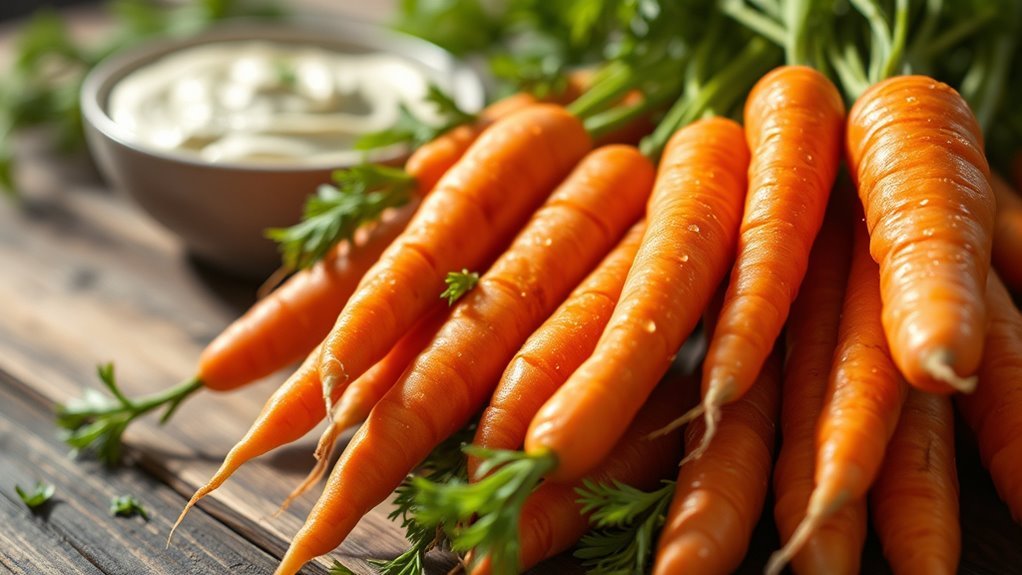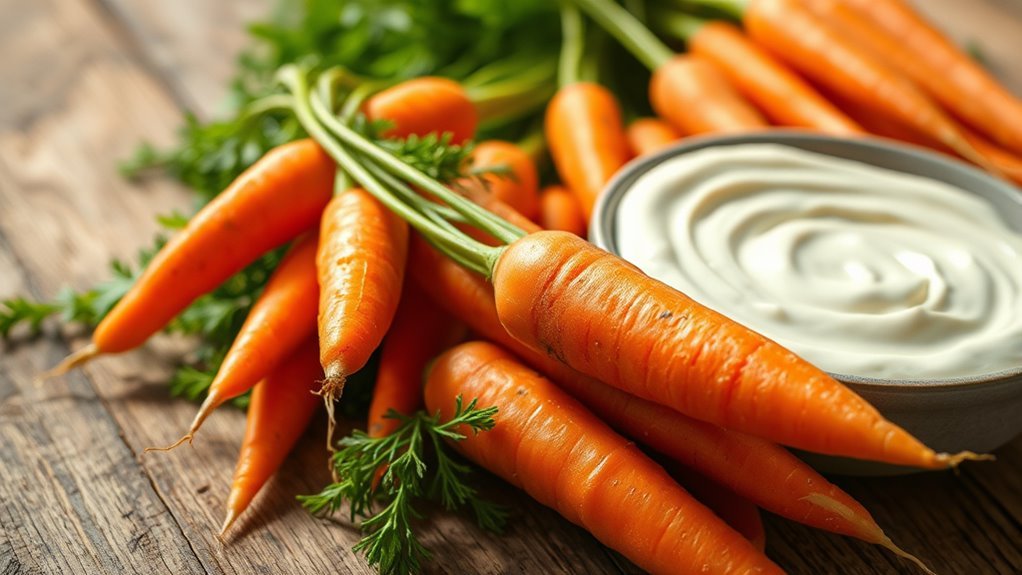Yes, you can eat carrots on the keto diet, but portion control is key. A medium carrot has about 6 grams of net carbs, so it’s best to enjoy them in moderation. Carrots also offer valuable nutrients like vitamins A, K, and C, while their fiber content can help balance carbs. Pair them with healthy fats to increase satiety. If you want to learn more about incorporating carrots into your diet effectively, keep exploring the options available.
Understanding Carbohydrates in Carrots

When you’re considering the keto diet, understanding the carbohydrates in carrots is essential, since not all veggies are created equal. Carrot varieties differ in their carbohydrate content, with some being higher than others. For instance, baby carrots tend to have more carbs than standard ones. Generally, a medium carrot contains about 6 grams of carbs, but the fiber content—around 2 grams—can help mitigate the impact on your net carbs. Since fiber isn’t fully digestible, it won’t hinder your keto goals as much. If you’re seeking a low-carb option, stick to smaller portions or select varieties with lower sugar content. This way, you can enjoy the crunch and taste of carrots while still staying within your dietary limits.
Nutritional Profile of Carrots

The nutritional profile of carrots reveals a wealth of benefits that can complement a keto diet, even with their moderate carbohydrate content. Rich in vitamins A, K, and C, carrots support immune function and eye health. Different carrot varieties, like orange, purple, and baby carrots, offer unique phytonutrients and antioxidants. These compounds not only enhance your health but also add vibrant color to your meals. Additionally, the fiber found in carrots can aid digestion, helping you feel full and satisfied. While it’s important to keep an eye on your carb intake, incorporating carrots in moderation can provide valuable health benefits without completely derailing your ketogenic goals. Embrace the versatility of carrots while enjoying their nutritional perks!
The Importance of Net Carbs

Understanding net carbs is essential for anyone following a keto diet, as it directly impacts your ability to maintain ketosis. Net carbs are calculated by subtracting fiber and certain sugar alcohols from the total carbohydrates. This carb counting technique helps you manage your carb intake more effectively, allowing for flexibility while staying within your limits.
| Component | Calculation |
|---|---|
| Total Carbs | 10g |
| Fiber | 4g |
| Net Carbs Definition | Total Carbs – Fiber |
| Net Carbs | 6g |
How Many Carbs Are in Carrots?
When considering carrots on a keto diet, understanding their carb content is vital. A typical serving size can greatly influence your daily carb intake, so it’s important to be mindful of portions. Additionally, calculating net carbs will help you better assess how carrots fit into your overall keto plan.
Carb Content Overview
Carrots, often celebrated for their vibrant color and crunch, are a common vegetable that many people enjoy. However, if you’re following a keto diet, understanding their carb content is vital. Different carrot varieties can have varying carbohydrate levels, affecting your daily intake. Here’s an overview:
| Carrot Variety | Carbs (per 100g) |
|---|---|
| Raw Carrots | 9.6g |
| Baby Carrots | 7.6g |
| Cooked Carrots | 6.0g |
When considering cooking methods, keep in mind that cooking can slightly reduce the carb content. While carrots can fit into a keto diet in moderation, it’s important to track your carb intake to maintain ketosis.
Serving Size Matters
Serving sizes play an essential role in managing your carb intake on a keto diet. When it comes to carrots, different carrot varieties can impact your overall carb consumption. For instance, a medium-sized carrot contains about 6 grams of carbs, but baby carrots or mini varieties may have slightly different values. It’s important to be mindful of portion sizes, as even small amounts can add up quickly. If you’re aiming to stay within your carb limits, consider measuring your servings. Enjoying carrots in moderation can allow you to savor their crunch and sweetness without derailing your keto goals. Balancing your intake with other low-carb vegetables can also help you maintain your desired dietary freedom.
Net Carbs Explained
Although many people enjoy carrots for their natural sweetness and crunch, understanding their net carb content is vital for those on a keto diet. Net carbs, by definition, are the total carbohydrates minus fiber and certain sugar alcohols that don’t greatly affect blood sugar levels. To calculate net carbs in carrots, first note that a medium carrot contains about 6 grams of total carbs. With roughly 2 grams of fiber, the net carbs calculation results in about 4 grams per carrot. While this isn’t excessively high, it’s important to monitor your intake if you want to maintain ketosis. Balancing your favorite foods like carrots with other low-carb options can help you enjoy your meals while sticking to your dietary goals.
Comparing Carrots to Other Vegetables
When considering the role of carrots in a keto diet, it’s essential to compare their nutritional profile to that of other vegetables. Carrots, while crunchy and sweet, do contain more carbs than many vegetable alternatives. Below is a simple breakdown to help you with carrot comparisons:
| Vegetable | Net Carbs (per 100g) |
|---|---|
| Carrots | 7.0g |
| Spinach | 1.1g |
| Zucchini | 3.1g |
| Cauliflower | 2.0g |
As you can see, while carrots offer vitamins and fiber, other veggies like spinach and zucchini provide lower net carbs, making them more suitable for your keto journey. Explore these alternatives to stay on track without sacrificing flavor.
Incorporating Carrots Into a Keto Meal Plan
When incorporating carrots into your keto meal plan, portion control is key to staying within your carb limits. A variety of low-carb recipes can help you enjoy their flavor without compromising your diet. Let’s explore some creative ways to add carrots to your meals while keeping your carb intake in check.
Carrot Portion Control
Incorporating carrots into your keto meal plan can be done successfully with mindful portion control. While carrots can fit into a low-carb diet, it’s essential to manage your carrot servings carefully to stay within your carb limits. Here are a few tips for managing portion sizes:
- Stick to Small Servings: Aim for about ½ cup of sliced carrots, which contains roughly 6 grams of net carbs.
- Pair with Fats: Combine carrots with healthy fats like avocado or olive oil to balance your meal and enhance satiety.
- Track Your Intake: Use a food diary or app to monitor your carrot servings and overall carb intake, ensuring you stay on track with your keto goals.
With these strategies, you can enjoy carrots while maintaining your desired freedom on the keto diet.
Low-Carb Recipe Ideas
Carrots can be a versatile addition to your keto meal plan, and there are numerous low-carb recipes that allow you to enjoy their natural sweetness without exceeding your carb limits. Try making low carb dips with carrot sticks for a crunchy snack or whip up roasted variations seasoned with herbs. Carrot salads and carrot slaw can add color and crunch to your meals, while soup recipes featuring carrots can be both warming and satisfying. For a creative twist, use spiralized noodles as a healthier pasta alternative. Stir-fried options and baked dishes can enhance your dinner repertoire, and don’t forget about smoothie additions to boost nutrition without a carb overload. Enjoy the freedom of incorporating carrots in delicious ways!
Tips for Eating Carrots on Keto
Although many people think of carrots as a go-to healthy snack, you might wonder how they fit into a keto diet due to their carbohydrate content. Here are some tips for incorporating carrot snacks while staying low-carb:
- Portion Control: Stick to small servings, about half a medium carrot or a few baby carrots, to keep carbs in check.
- Pair with Keto Dips: Enhance flavor and satisfaction by dipping carrots in low-carb options like guacamole, cream cheese, or ranch dressing.
- Balance with Other Veggies: Mix carrots with lower-carb vegetables, like celery or cucumber, to create a colorful and keto-friendly snack platter.
Potential Benefits of Carrots on a Keto Diet
Including carrots in your keto diet can offer several nutritional benefits that contribute to overall health. While they contain some carbohydrates, their high nutrient density makes them a worthwhile addition. Carrots are rich in vitamins A, C, and K, which support immune function and vision. These veggies also provide antioxidants that combat oxidative stress in your body. Plus, the fiber in carrots aids digestion, helping you feel full and satisfied. Incorporating carrots mindfully can enhance your meals without derailing your keto goals. You’ll appreciate the balance they bring, contributing to carrot health without overwhelming your carb intake. Remember, moderation is key, but these vibrant veggies can certainly fit into your keto lifestyle. Enjoy the freedom of nutritious choices!
Alternatives to Carrots for Keto Followers
While carrots can be a nutritious addition to a keto diet, there are several alternatives that can help you stay within your carbohydrate limits without sacrificing flavor or nutrition. Consider these tasty options:
Carrots are nutritious, but there are many low-carb alternatives that enhance flavor and nutrition on your keto journey.
- Zucchini Noodles: A great pasta substitute, they’re low in carbs and high in vitamins.
- Cauliflower Rice: This versatile option can replace traditional grains and is packed with nutrients.
- Bell Pepper Strips: Crunchy and colorful, they add a sweet flavor while keeping carbs low.
You can also enjoy radish slices, cucumber sticks, celery hearts, broccoli florets, and fresh spinach salads. These alternatives not only satisfy your cravings but also provide essential nutrients, helping you thrive on your keto journey.
Final Thoughts on Carrots and Keto
When considering carrots on a keto diet, it’s important to weigh their carb content against their nutritional benefits. While they do offer vitamins and fiber, their higher sugar levels might not fit into everyone’s daily carb allowance. Exploring keto-friendly alternatives can help you maintain your goals while still enjoying a variety of flavors and nutrients.
Carrot Carb Content
Carrots contain about 9 grams of carbohydrates per 100 grams, making them a moderate choice for those following a keto diet. If you’re considering incorporating them, keep these points in mind:
- Carrot Varieties: Different types of carrots, like baby or purple carrots, can have slightly varying carb content.
- Cooking Methods: Raw carrots typically retain more nutrients and fiber, while cooking can concentrate flavors but may alter carb levels.
- Portion Control: It’s essential to monitor your portion sizes to stay within your daily carb limits.
While carrots can fit into your keto plan, balancing them with other low-carb vegetables will allow you the freedom to enjoy a diverse diet while keeping your carbs in check.
Nutritional Benefits Overview
Incorporating carrots into your keto diet can offer a range of nutritional benefits that enhance overall health. While they do contain some carbs, the health benefits they provide may outweigh concerns for many. Carrots are rich in vitamin A, which plays an essential role in maintaining vision, immune function, and skin health. They also contain antioxidants that help combat oxidative stress. Additionally, the fiber in carrots can support digestive health, making them a satisfying option for those seeking variety in their meals. By enjoying carrots in moderation, you can tap into their impressive vitamin content while still adhering to your keto goals. Remember, balance is key, and incorporating nutrient-dense foods like carrots can help you thrive on your journey.
Keto-Friendly Alternatives
Finding keto-friendly alternatives to carrots can help you maintain variety in your meals while sticking to your carb limits. Here are some great vegetable substitutes to ponder for your keto snack ideas:
- Celery: Low in carbs and high in water content, celery is a crunchy option that pairs well with dips.
- Cucumber: This invigorating vegetable is not only low in carbs but also versatile enough for salads or snacking.
- Radishes: With a peppery flavor, radishes can be roasted or eaten raw, providing a satisfying crunch without the carbs.
Incorporating these substitutes can keep your meals exciting while ensuring you stay on track with your keto journey. Embrace these options for a delicious and satisfying lifestyle!
1. Can I eat carrots on a keto diet?
Yes, you can eat carrots on a keto diet, but moderation is key. Carrots are higher in carbohydrates compared to many other non-starchy vegetables. A medium-sized carrot contains about 6 grams of carbohydrates, which can take up a significant portion of your daily carb allowance on a strict ketogenic diet. It’s essential to account for these carbs in your overall daily intake to maintain ketosis.
2. How many carbs are in a serving of carrots?
A medium carrot (about 61 grams) typically contains around 6 grams of carbohydrates, with approximately 1.5 grams of fiber. When you factor in fiber, which is not fully digested, the net carbs amount to about 4.5 grams. Therefore, if you’re following a strict keto diet, it’s advisable to keep your carrot intake limited and consider net carbs when planning your meals.
3. What are some keto-friendly alternatives to carrots?
If you’re looking for keto-friendly alternatives to carrots, consider vegetables with lower carbohydrate content. Options include celery, zucchini, bell peppers, and leafy greens like spinach and kale. These vegetables offer similar crunch and versatility in dishes without significantly impacting your carb limit.
4. Are there any health benefits to eating carrots on a keto diet?
Carrots are rich in vitamins, particularly vitamin A, and offer other nutrients like potassium and antioxidants. Including them in moderation on a keto diet can be beneficial for overall health. Vitamin A is essential for eye health, while antioxidants help combat oxidative stress in the body. Just remember to balance their intake with your overall carb consumption to stay within your keto goals.
5. How can I incorporate carrots into a keto-friendly meal?
You can incorporate carrots into a keto-friendly meal by using them in small amounts. For example, you might add shredded carrots to a salad for texture and flavor or use them in a stir-fry with lots of low-carb vegetables and protein. Another option is to roast or sauté them with olive oil and seasoning, ensuring the portion size remains within your carbohydrate limits. Pairing carrots with high-fat dips, like guacamole or ranch dressing, can also make them a satisfying snack while keeping your overall carb intake in check.
References
- https://www.healthline.com/nutrition/can-you-eat-carrots-on-keto
- https://www.medicalnewstoday.com/articles/325348
- https://www.verywellfit.com/can-you-eat-carrots-on-keto-5193575
- https://www.dietdoctor.com/low-carb/keto/vegetables
- https://www.ncbi.nlm.nih.gov/pmc/articles/PMC6511052/
- https://www.usda.gov/
- https://www.webmd.com/diet/obesity/ss/slideshow-keto-diet-overview
- https://www.clevelandclinic.org/health/diet-nutrition/what-is-the-keto-diet


